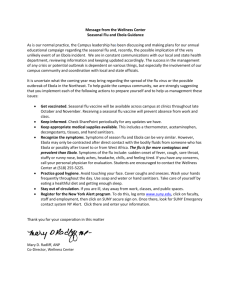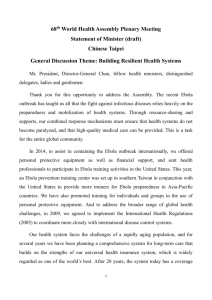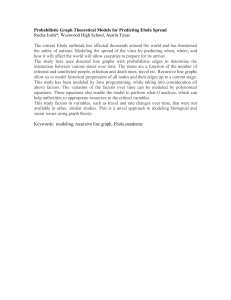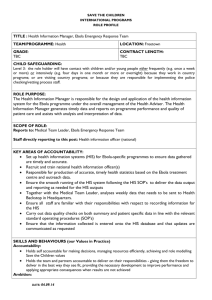November 2014 5 Studies you may have missed
advertisement
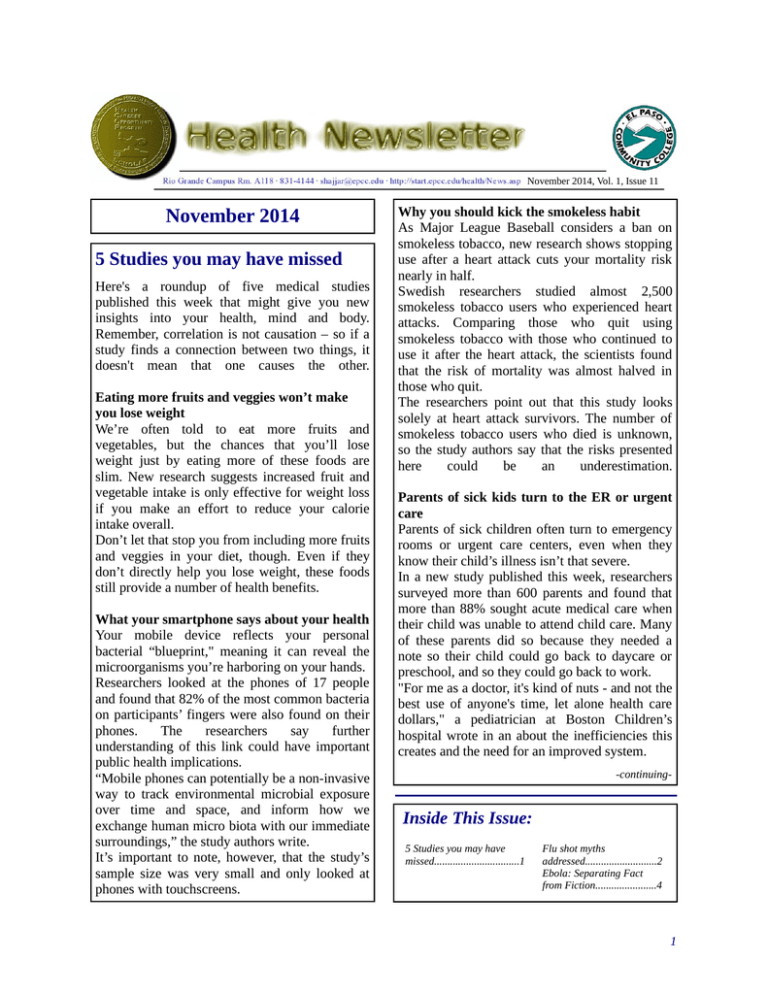
November 2014, Vol. 1, Issue 11 November 2014 5 Studies you may have missed Here's a roundup of five medical studies published this week that might give you new insights into your health, mind and body. Remember, correlation is not causation – so if a study finds a connection between two things, it doesn't mean that one causes the other. Eating more fruits and veggies won’t make you lose weight We’re often told to eat more fruits and vegetables, but the chances that you’ll lose weight just by eating more of these foods are slim. New research suggests increased fruit and vegetable intake is only effective for weight loss if you make an effort to reduce your calorie intake overall. Don’t let that stop you from including more fruits and veggies in your diet, though. Even if they don’t directly help you lose weight, these foods still provide a number of health benefits. What your smartphone says about your health Your mobile device reflects your personal bacterial “blueprint," meaning it can reveal the microorganisms you’re harboring on your hands. Researchers looked at the phones of 17 people and found that 82% of the most common bacteria on participants’ fingers were also found on their phones. The researchers say further understanding of this link could have important public health implications. “Mobile phones can potentially be a non-invasive way to track environmental microbial exposure over time and space, and inform how we exchange human micro biota with our immediate surroundings,” the study authors write. It’s important to note, however, that the study’s sample size was very small and only looked at phones with touchscreens. Why you should kick the smokeless habit As Major League Baseball considers a ban on smokeless tobacco, new research shows stopping use after a heart attack cuts your mortality risk nearly in half. Swedish researchers studied almost 2,500 smokeless tobacco users who experienced heart attacks. Comparing those who quit using smokeless tobacco with those who continued to use it after the heart attack, the scientists found that the risk of mortality was almost halved in those who quit. The researchers point out that this study looks solely at heart attack survivors. The number of smokeless tobacco users who died is unknown, so the study authors say that the risks presented here could be an underestimation. Parents of sick kids turn to the ER or urgent care Parents of sick children often turn to emergency rooms or urgent care centers, even when they know their child’s illness isn’t that severe. In a new study published this week, researchers surveyed more than 600 parents and found that more than 88% sought acute medical care when their child was unable to attend child care. Many of these parents did so because they needed a note so their child could go back to daycare or preschool, and so they could go back to work. "For me as a doctor, it's kind of nuts - and not the best use of anyone's time, let alone health care dollars," a pediatrician at Boston Children’s hospital wrote in an about the inefficiencies this creates and the need for an improved system. -continuing- Inside This Issue: 5 Studies you may have missed................................1 Flu shot myths addressed...........................2 Ebola: Separating Fact from Fiction.......................4 1 November 2014, Vol. 1, Issue 11 5 Studies you may have missed (cont.) Improving the environment can improve your health Less pollution could lead to better respiratory health, a new study suggests. Researchers at Duke University found that as air quality improved, fewer people died from emphysema, asthma and pneumonia. For almost two decades - from 1993 to 2010 - the researchers examined the levels of nitrogen dioxide, ozone, carbon monoxide, sulfur dioxide and other air pollutants in North Carolina. They then compared this information with the death rates of the population that were attributed to respiratory diseases. The results were adjusted for smoking and seasonal fluctuations of certain respiratory diseases. Source: http://thechart.blogs.cnn.com/ Flu shot myths addressed Flu vaccine myths can confuse people trying to decide whether to get a shot. Here are five common myths and, based on information from the Centers for Disease Control and prevention, the truth. The shot can give you the flu Not so, says the CDC. The viruses in flu shots are killed during the production of the vaccine, which means they cannot cause infection. The vaccine batches are then tested, with a group of people randomly assigned to get either the vaccine or salt water. The only difference in symptoms was increased soreness in the arm and redness at the injection site among people who got the flu shot. There were no differences in terms of body aches, fever, cough, runny nose or sore throat. Still, some people feel bad after a flu shot. Soreness at the injection site is one reason, but it usually dissipates within two days. It’s caused by the immune system making antibodies to the killed viruses in the vaccine that helps a person fight the flu. The Advisory Committee on Immunization Practices says symptoms, in rare instances, including fever, muscle pain, and discomfort or weakness, which also typically go away after a day or two. And, though a flu shot won’t give you the flu, its protection doesn’t kick in for two weeks from the time of injection. During that time, you are vulnerable. In addition, it’s easy to confuse seasonal flu for an illness, caused by a number of other pathogens, including rhinovirus. Or you may be exposed to a flu virus that is not included in the vaccine. Finally, the flu shot not always works— particularly among the elderly and people with weak immune systems. But even among these high-risk groups, the vaccine can prevent complications. It is better to get the vaccine later in the season to limit the risk that its efficacy will wane No. The shot lasts an entire flu season, except for some children who may need two doses. The CDC recommends that all people older than 6 months get a vaccine. The flu shot might adversely affect my pregnancy No, the flu vaccine is “an essential element of prenatal Care” and is recommended for all pregnant women, according to the American College of Obstetricians and Gynecologists. Pregnant women are among the group at increased risk for flu complication like pneumonia, infections and dehydration. -continuing- 2 November 2014, Vol. 1, Issue 11 Flu shot myths addressed (cont.) Though babies cannot be vaccinated until they have reached 6 months of age, antibodies they received in utero from their mothers may help protect them. But note that the group recommends against the nasal spray—the live, attenuated version—for pregnant women. The CDC says seasonal flu vaccine shots have not been shown to cause harm to pregnant women or their babies. I’ve had the flu before and it was no big deal, so bring it on No. Seasonal flu exacts a bigger toll in some years than in others: Between 1976 and 2007, the flu was linked to a low of 3,000 to as many as 49,000 fatalities in the United States, with more than 200,000 hospitalizations. There are two main reasons: The viruses that circulate in one year may be different from those that circulate in another. And of course, people change from year to year, meaning that your response to a viral infection one year may not be the same as your response in another. The flu shot doesn’t work It doesn’t work all the time, but it does confer some level of protection. For example, the CDC says preliminary date for the 2010-2011 season show that it was about 60% effective for all age groups combined, and studies for earlier years found protection rates of up to 90%. Source: http://www.cnn.com Ebola: Separating Fact from Fiction With Ebola making the news lately, there’s a lot of information floating around the disease. It’s sometimes hard to know what to believe and whether Ebola is real concern in the United States. It is important to keep things in perspective –the U.S. medical system is far different from medical care in Africa. Here are the facts about Ebola and what the disease means for people living in the United States. Is Ebola Rare? Ebola is a rare, but serious viral disease. In the nearly 40 years since its discovery, there have been about 25 outbreaks in Africa countries. About 2,500 people were infected during all these outbreaks. Compare that to the 2012 U.S. outbreak of whopping cough when nearly 50,000 people got sick in one year, and you can see how rare Ebola is. The current Ebola outbreak in Africa is getting widespread attention because it is larger than previous outbreak and affected multiple countries. Can You Get Ebola from Touching Someone Sick With Ebola? People get Ebola by coming into direct contact with someone who is sick with Ebola, Blood, and bodily fluids, and contaminated objects, such as needles, clothing or bedding, can spread the virus. Bodily fluids include urine, feces, saliva, mucus, vomit, breast milk and semen. -continuing- 3 November 2014, Vol. 1, Issue 11 Ebola: Separating Fact from Fiction (cont.) Can You Get Ebola from Sexual Contact? It is possible to spread Ebola through sexual contact. Semen and vaginal secretions are among the bodily fluids that can spread the virus. The virus can remain in a man’s semen for up to seven weeks after he has recovered from Ebola. During this time, it is possible for him to give Ebola to his sexual partner. Experts recommended not to having sex for seven weeks after recovering and using a condom for any sexual contact during that time. Is It Safe to Travel with Someone Sick with Ebola? People with Ebola have to have symptoms to spread the disease. Before symptoms develop, people aren’t contagious. You must come into direct contact with bodily fluids after a person exhibits symptoms. Being on an airplane or in an airport with a person infected with Ebola who does not have symptoms is a low-risk situation. This means it’s unlikely that you would acquire the infection. Do people With Ebola Have Bleeding? Internal and external bleeding is the most recognizable symptoms of Ebola. But it doesn’t happen to everyone who gets the disease. Early on, Ebola takes the form of bruising, oozing blood from needles stick sites, bloody noses, and bleeding gums or eyes. Bleeding is rarely life threatening. How hard is it for the Ebola Virus to spread? Ebola doesn’t spread easily like a cold or the flu. You can catch a cold or flu from being around a sick person because it spreads through the air. But several things have to happen to catch Ebola. First, the person with Ebola has to have symptoms in order to become contagious to others. Then, you have to touch their blood, bodily fluids, or a contaminated object such as sheets. The virus has to enter the body through a cut, broken skin or your eyes and nose, mouth, or other area with mucus membranes. Ebola is not a sturdy gem. Good hygiene, disinfection, and infection-control methods can prevent all the ways Ebola spreads. Do people Survive Ebola? Currently, there is no cure for Ebola, but people do survive the disease. Getting good supportive medical care early in the disease plays a big role in surviving Ebola. Supportive care includes isolating the patient, giving intravenous fluids and balancing electrolytes, monitoring blood pressure and maintaining oxygen levels. Generally, African healthcare systems are fragile and about half people who get the diseases will survive it. The odds of surviving Ebola in the United States are higher because the U.S. medical system is one of the world’s best. People who recover from Ebola have antibodies to the disease that protect them for about 10 years. http://www.healthgrades.com/ 4

